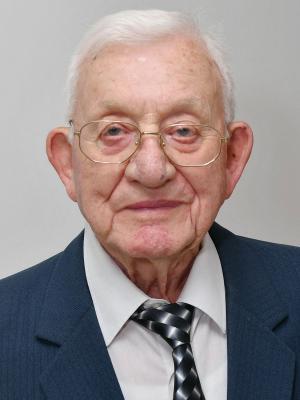Shmuel Blumenfeld was born in 1926 in the city of Krakow, Poland, to a family of rabbis and scribes. When he was born, his family of seven moved north to the town of Proszowice.
Days after they invaded Poland in September 1939, Proszowice was occupied by the Germans.
"In early 1942, they seized young men for forced labor, but I evaded it. But when they arrested my father, I came forward. I was beaten and detained in a prison, and from there they sent me to Plaszow, a forced labor camp near Krakow."
Shmuel's father, Avraham Yehoshua Heshl Blumenfeld, was murdered at Plaszow.
In June 1942, Shmuel was witness to an Aktion, in which Jews were deported from Krakow.
"I saw Germans, Poles and men from the Jewish Order Police guarding the deportees. They put them on the trains and locked the wagons. I knew they were going to their deaths, and I decided to escape and return home. I only wished to die with my family. I sneaked away with the shovel, and made the 40-kilometer journey home, to Proszowice."
In August 1942, the town was surrounded in advance of the liquidation of the Jews of the town. "I told my friend, 'Let's escape to the labor camp.' My mother [Roza Blumenfeld née Platkewicz] also urged me to do so. She felt that they and all the Jews of the town were going to die. She gave me half the money she had. I never imagined that would be that last time I would see my family."
Before the deportation of the Jews from Proszowice to the Belzec extermination camp, Shmuel managed to escape to the Krakow ghetto. In March 1943, the ghetto was liquidated and Shmuel was deported to Auschwitz. When he arrived, he was selected for forced labor and sent to work in a coal mine.
On 18 January 1945, with the approach of the Red Army, Shmuel was forced on a death march with other prisoners. On reaching Buchenwald, he was sent to the Reimsdorf camp, where he was made to clear out bomb shrapnel and repair roofs that were damaged by Allied bombings.
In April 1945, Shmuel was sent on another death march – this time to the Terezin ghetto – and in May 1945, he was liberated by the Red Army. He returned to Poland and searched for his family, but discovered to his devastation that they had all been murdered. He joined a kibbutz set up by the Dror youth movement and began to help with the "Bericha" movement – the illegal immigration of hundreds of thousands of Holocaust survivors to western Europe on their way to Eretz Israel (Mandatory Palestine).
In 1948, Shmuel immigrated to Israel and enlisted in the IDF. Upon his release, he joined the prison service. During the Eichmann trial, Shmuel was one of Eichmann's guards. "I showed him the number on my arm and said, 'You see this is an authentic number? I was in Auschwitz for two years and I survived.'"
Shmuel was one of the founders of the Association for Proszowice Immigrants, and was active in commemorating the town's Jews lost in the Shoah. He submitted hundreds of Pages of Testimony in memory of members of his community who were murdered in the Holocaust. He helped maintain the local Jewish cemetery, and erected a monument in the town in memory of the murdered.
Shmuel z"l and Rivka have two children, six grandchildren and seven great-grandchildren.
* Shmuel Blumenfeld passed away on 15 April 2022.







